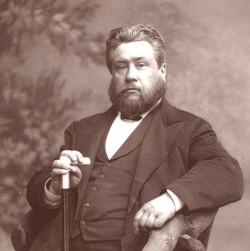
A clean conscience is a wonderful thing.
Just ask the great apostle. The joyful confidence Paul has in a clean conscience seeps out of almost every one of his letters. But not only his letters, also Luke’s recounting of his missionary ministry in Acts. One pertinent reference is Acts 20:26-27, where Paul told the Ephesian elders, “Therefore I testify to you this day that I am innocent of the blood of all, for I did not shrink from declaring to you the whole counsel of God.” In other words, “My conscience is clean before you because I declared the whole counsel of God.”
Preacher, if you have been at your church for any length of time, would you be able to say with Paul, “My conscience is clean?”
A PLEA FOR BALANCE
Preaching the whole counsel of God means giving due attention to the fundamental nature of our Sovereign and Holy God, the sinfulness of man, the way of salvation in Christ, and the life we now live by faith in the Spirit. At the risk of employing an increasingly vapid buzz-phrase, a” gospel-centered” hermeneutic in preaching is essential to preaching the whole counsel.
But mere gospel-centrality is not all. What “whole-counsel preaching” means is actually preaching the whole counsel of God’s words; the old and new testaments, the predictions and expositions of Christ, prophecy and poetry, truth from the narrative and apocalyptic. If someone was to look at your church’s preaching calendar over the last few years would they see this kind of balance? Or would they see lots of similar studies? Something like five out of seven years occupied with Pauline epistles, or eight out of ten years spent in one of the testaments.
Brothers, this should not be so.
A SIMPLE SCHEME
When we planted IDC at the beginning of 2013 we did so with at least one burning conviction when it came to preaching: Striving for balance between the testaments and the genres in the annual sermon calendar. Coupled with that was a commitment to rarely, if ever, spend more than twelve months in one particular book. I regularly tell people that I’m much more willing to be accused of going through a book too quickly than too slowly. The length of a series is like the length of a sermon; people will rarely forget the long, but will almost always forgive the short.
At IDC we minister in a context where a fair subset of our congregation will come and go within five years. My hope then is that when people leave after a few years of attending our church they have a real sense of the whole counsel of God. Certainly there are worse things than faithfully expositing Romans for three years, but I think we can – and ought to – give our churches a fuller diet of Scripture.
Here’s how our aim for balance in the preaching calendar has worked itself out so far:
- January-May ’13: 1 Timothy
- June ’13: Ruth
- July ’13: Haggai
- August ’13 – June ’14: Mark
- July-August ’14: Summer series on the means of grace
- September-December ’14: Job
Next year our plan, Lord willing, is:
- January-April ’15: 1 John
- May ’15: Jonah
- June-August ’15: Genesis
- September ’15 – May ’16: Romans
Whether or not it works out exactly that way, it should give you a picture of how we try to practice our striving for balance between the testaments and genres. Such a pursuit has at least two advantages.
TWO ADVANTAGES OF BALANCED PREACHING
First, it gets the preacher out of his comfort zone. Every preacher I’ve met has his personal comfort zone when it comes to preaching. For some it’s narrative, for others (like me) it’s the epistles, or for guys like John Macarthur, it’s the New Testament. Pursuing the kind of balance I’m advocating for will, I think, in the end make the preacher more well-rounded than he would naturally be. I’m currently preaching through Job and it is stretching me in ways I’ve never before experienced. That stretching has to be inextricably related to the fact I’ve never preached an entire book of wisdom. The growth curve is also due, I think, to the fact we are covering 42 chapters in 14 weeks. I’m learning what it means to preach huge chunks of Scripture in one setting. I trust this whole endeavor, of which I would never naturally gravitate towards, is making me a better preacher. It’s definitely getting me out of my comfort zone.
Second, it gets the church out of her comfort zone. This reality came to me so clearly after last weekend’s service. A dear older saint in our church came up to me after the sermon and said, “I want you to know I’m so excited about Job. I can’t remember the last time I’ve looked forward to a series this much. I think it is because I don’t know Job as well as the gospel of Mark or the book of Ruth. It’s all fresh to me!” Based on the responses I keep hearing from our church, this member’s experience is not unique. A preaching diet that is wisely scattered across the whole canon will often place church members among new vistas of truth. And newness usually breeds excitement. It not only gets them out of their personal comfort zone, it also let’s them see how all Scripture is God-breathed and useful.
IS IT CLEAN?
Our churches need the whole counsel of God; they need a preaching diet that balances the vast and varied unsearchable riches.
So preacher, how’s your conscience in preaching the whole counsel?
 Back in my soccer playing days it was always interesting to see how guys prepared their mind for the game at hand.
Back in my soccer playing days it was always interesting to see how guys prepared their mind for the game at hand.





